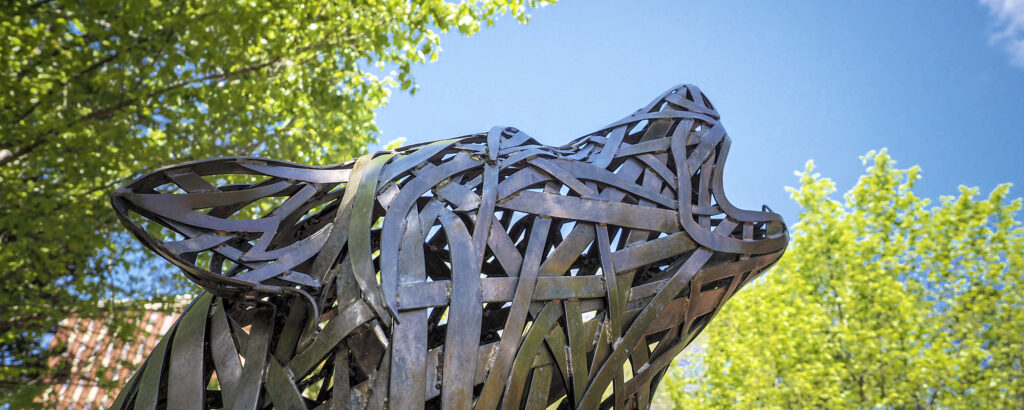
“The answer to the question, ‘Can I pursue global health at NC State?’ is a resounding ‘Yes!’” says Mallory Bryan ’21, executive director of NC State’s Global Health Cooperative.
Bryan worked with Odai Mansour ’21, Annie Haunton ’22, and a few other friends to establish the Global Health Cooperative in fall 2019. The group helps students interested in studying global health cross disciplinary boundaries and navigate the many resources and opportunities at NC State and throughout the Triangle.
“Our goal is to connect individuals interested in global health with one another and with a valuable network of resources to collaboratively pursue education and enrichment,” Bryan shares. “Ultimately, we aim to advance the presence of global health at NC State and its impact around the world.”
The Global Health Cooperative came to fruition when a group of Park Scholars recognized the need for a centralized resource for students interested in global health.
Improving Access to Education, Experiences, and Service
“My biggest resource was older Park Scholars like Rachel Walter ’18 and Cambray Smith ’18, who were using their specific majors to pursue a career in public health,” Bryan explains. After they graduated, Bryan moved to establish a community for students pursuing in the field. “There are so many students at NC State who are interested in leveraging their degree to make an impact in global public health, but it’s hard to do that alone without a network or resources.”
“We created this organization to improve access to education, experiences, and service related to global health,” explains Mansour, a co-founder of the Global Health Cooperative. “It took each of us about one to two years to get into this field because of the lack of organized resources, so we decided that we could help other students break into it sooner if we worked to organize resources.”
As executive director, Bryan guides the vision of the cooperative and supports a cohort of student directors with establishing goals and turning them into reality. “Getting to lead the team of directors is honestly my favorite part of my role,” Bryan shares. “Each one has a different set of strengths and interests, and yet they all share this contagious, common passion for empowering other students around them to pursue interdisciplinary impact in global public health.”
Mansour is one of those directors. “As Director of Academic Enrichment, I connect students to resources related to pursuing global health in their coursework.” Mansour focuses on making it easier to locate the many resources already available on campus. “Last year I created a directory that lists all of the NC State courses that are in some way related to global health. Students can access it on our website when they’re looking for courses to take.”
Bryan and Mansour both credit their Park Scholarships Learning Lab II trip for leading them to create the Global Health Cooperative. “My experience serving as a co-chair for Learning Lab II taught me how to successfully lead a team and turn an idea into reality,” Bryan explains.
Mansour emphasizes the focus of the trip, which explored national leadership in relation to domestic health care concerns and crises, drew him to this field. “Learning Lab II helped solidify my interest in looking at health equity outside of my community, which ultimately led me to global health and this organization,” he says.
NC State’s Non-Medical Focus On Global Health Can Be an Asset
Over the last two years, the Global Health Cooperative at NC State has grown from a few friends with a shared interest to a network of more than 100 students from a diverse array of colleges and majors all passionate about preparing themselves to make an impact. The group puts out a weekly email with information about events and resources, hosts networking events each semester, initiated a podcast series that highlights unique stories of students and community members making a difference in public health, and hosts several service events around Raleigh including at Alliance Medical Ministry, Operation Mask-Up, and The Food Bank of Central North Carolina. The group has created a database of NC State courses related to public health and has launched a website to compile and share resources and information.
“One of my favorite events that we’ve been able to organize was hosting [faculty advisor and Director of Student Health Services Julie] Casani for a Zoom session to talk about COVID-19 in the middle of the initial outbreak in North Carolina,” Mansour explains. “We’ve had to shift to Zoom meetings for the past year, but we’ve turned this into an opportunity for networking and community building by using breakout rooms to encourage other students to talk about research, academics, service, and more. Mallory uses the Park Scholarships ‘undiscovered luck’ activity as an influence for this, and it’s been really helpful in providing students with the interaction we’ve missed in online classes.”
While NC State does not offer an explicit track on global health, students have found many unique pathways to explore the interdisciplinary field emphasizing their own specific interests. “Dr. Casani always reminds us that NC State’s non-medical focus on global health can be an asset,” Mansour says.
Bryan and Mansour graduate this spring and both will pursue careers in public health. Mansour plans to apply to medical school after graduation and Bryan has been admitted to the Masters of Public Health program at the UNC Gillings School of Global Public Health. “The decision to go to graduate school to continue my education in public health was directly fueled through my experience leading the Global Health Cooperative,” she explains.
Mansour intends to focus on using global health concepts to increase access to health care and improve resources and education. “Working with the Global Health Cooperative has given me great experience identifying ways to make resources accessible, and it’s shown the importance of teamwork in any avenue of global health work.”